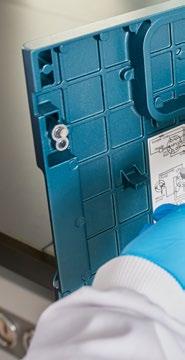










UCD CONWAY is a leading biomedical research institute, underpinned by the most comprehensive suite of centrally managed core technology facilities in Ireland. UCD Conway strives to facilitate every opportunity to advance interdisciplinary research, innovation and education in Ireland, directly supporting national objectives within Impact 2030 and priorities within Creating the Future.
This has enabled Conway Fellows to lead successful bids for national technology platforms such as the Comprehensive Molecular Analysis Platform and the National Spatial Tissue Profiling (NaSPro) platform, directly supporting the UCD Strategy 2020-2024: Rising to the Future.
It is essential that we maintain and build on that strength, in terms of upgrading and advancing technology suites to ensure future investigator-led research success. As Director, my main role is to represent and support the Conway research community towards that goal.
Interdisciplinarity is our strength. In the last 5 years, the Conway research community has grown by 33%, primarily attributed to early career researcher appointments. We welcomed 17 new Fellows through Ad Astra and reactive hires from 8 disciplines in the last 2 years, including colleagues from the UCD Schools of Biosystems & Food Engineering and Mechanical & Materials Engineering.
We continue to strengthen links with sister UCD Institutes and Centres while also supporting grassroots initiatives internally to provide the opportunity for researchers to gather momentum in emerging areas of research (for example: organoids, extracellular vesicles) and technology.
Mentorship and collegiality are key personal remits for my directorship. The research environment is highly competitive, and it is our responsibility to support and nurture potential future technological and intellectual success, and importantly to create an environment that is firmly embedded within a positive research culture.
Professor Helen Roche Director, UCD Conway Institute
growth in the Conway research community in the past 5 years
17new Fellows welcomed through Ad Astra and reactive hires from 8 disciplines in the last 2 years
UCD Conway Institute is home to many of Ireland’s most outstanding performers in the biomedical sciences, accounting for 17% (¤21.8 million) of UCD’s total research income in 2020/21 while accounting for only 7% of academic staff.

THE MEMBERSHIP PROFILE of 130 Conway Fellows spans 3 Colleges and 10 Schools showing the inclusive, interdisciplinary and collaborative nature of the research environment. Colleges and Schools benefit from their researchers leveraging Institute resources. The 130 associated research teams are also considered members of the Institute (223 PhD, 26 MSc, 160 postdoctoral and research fellows) bringing the total research community to 539 people.
The exceptional research environment with key operational & infrastructural supports has enabled the establishment of large-scale initiatives and programmes over the lifetime of the previous strategy including Innovative Medicines Initiative (IMI) SOPHIA in 2020 and HIPPOCRATES in 2021. IMI SOPHIA (www.imisophia.eu) is an EU academia-industry pre-
competitive consortium to optimise future obesity therapy led by Professor Carel Le Roux valued at ¤16M: and IMI HIPPOCRATES (www.hippocrates-imi.eu) is an EU academia-industry research project led by Professors Oliver Fitzgerald and Stephen Pennington worth ¤21 million that aims to improve the diagnosis and treatment of patients living with psoriatic arthritis. The Institute has also enabled researchers to achieve significant research outputs during the period.
Our proactive policy for the translation of research has enabled researchers to begin their entrepreneurial journey in dedicated bioincubation space, foster engagement and forge valuable industry partnerships. Start-up companies, Atturos, ATXA Therapeutics and Berand are among the current clients.
funding
million
million)
publications
with researchers in other countries /regions
for IMI SOPHIA –an EU academia-industry pre-competitive consortium to optimise future obesity therapy led by Professor Carel Le Roux
for IMI HIPPOCRATES – an EU academia-industry research project led by Professors Oliver Fitzgerald and Stephen Pennington
people in our research community
UCD Conway Institute is an interdisciplinary research centre, providing a suite of technologies to explore mechanisms of health and disease towards the development of preventative strategies, novel diagnostics and therapeutic solutions.
Our vision is to be a leader in biomedical research and innovation; translating this knowledge through industrial, academic and clinical partnerships to benefit health and well-being in Ireland and beyond.
Research & Innovation
Clinical Partnerships Health & Well-being
At UCD Conway Institute, collegiality is our core value with excellence, integrity, diversity and engagement being an integral part of our ethos. Conway researchers and support staff create a vibrant and dedicated home for research and innovation where interdisciplinary collaborations, new ideas and research excellence thrive.
This research culture is arguably our most important achievement. It continually delivers high-calibre research and innovation outputs including peer-reviewed publications in leading scientific journals; knowledge transfer to biomedical and medical device sectors; talented scientists ready to embark on successful career paths in and beyond academia; and engagements with communities who may ultimately benefit from our research.

The UCD Conway Institute provides an exceptional research environment with key operational & infrastructural supports; leading core technology access and dedicated expertise; education & training for early career researchers; project management supports as well as communications, public engagement, and patient involvement expertise.
THIS ENVIRONMENT PROVIDES compelling justification within grant applications and has enabled the establishment of large-scale initiatives and programmes over the past decade. Additionally, the close alignment with clinical colleagues provides many opportunities to enable translational medicine.

The strategic research direction of the Institute has evolved over time to enable our academic community to successfully navigate the priorities of the funding landscape, nationally and internationally. As we enter the next period in the lifecycle of the Institute, we are cognisant of the external and internal factors that shape and guide our ambitions for this research strategy particularly Impact 2030, the Government's blueprint for building a more inclusive and engaged research and innovation system and the possibilities arising from Creating the Future, the recent national consultation on research.
Within the context of the UCD Strategy 2020-2024: Rising to the Future, UCD Conway Institute is well positioned to contribute to the ambitions expressed under Theme 03: Building a Healthy World.
“We will advance the understanding of human, animal and environmental health and wellbeing for the benefit of society; from the cellular level to the population level, and from the individual level to the biosphere as a whole – recognising the interconnectivity between all living things and utilising the One Health concept.”
With the extensive reliance on ‘big data’ in research and several of the core technology platforms generating high dimensional data sets, we can also find complementarity in Theme 3: Transforming through Digital Technology. Future developments in data analysis and artificial intelligence will bring challenges and opportunities to our research.
Diabetes Complications Research Centre (DCRC)
on the macro and macrovascular complications of diabetes and obesity (led by Professor Catherine Godson and including Profs. Donal O’Shea, Carel le Roux) Systems Biology Ireland
new therapeutic approaches to cancer using the power of computers and mathematical
Precision Medicine facility launch
milestone for cancer care in Ireland (led by Professor Brendan Loftus)
Oncology Ireland Consortium to develop new diagnostics and therapeutics for personalised cancer treatment (led by Profs Walter Kolch and William Gallagher)
Hipprocates
EU and industry funded psoriatic arthritis research programme (led by Profs Stephen Pennington and Oliver Fitzgerald)
Irish Cancer Society
first Collaborative Cancer Research
by Professor William Gallagher)
Centre of Excellence in Rheumatology
first award designation
by Professor Douglas Veale & Professor Gerry Wilson)
Centre in Translational Oncology
academic centre (led by Professor Amanda McCann)
Sophia
EU academia-industry pre-competitive
to optimise future obesity therapy
by Prof Carel Le Roux)
UCD Conway Institute is aligned to the UCD Strategy for Research, Innovation and Impact, which focuses on Objective 1: Increase the quality, quantity and impact of our research, scholarship, and innovation.
In 2021, we established an internal stakeholder group with representation from the cognate Schools that now formalises optimal working relationships. The UCD Conway Stakeholder Forum supports research excellence unique to the Institute while complimenting and supporting the strategic research aims of cognate UCD Schools and sister UCD Institutes and Centres towards achieving objectives under Shaping the Future; UCD Strategy for Research, Innovation & Impact 2020-2024.
We are positioned well to play a pivotal role in a cohesive ecosystem for research and innovation in line with Impact 2030, Ireland’s national policy framework. It represents an opportunity for the Institute to contribute to creating an inclusive research and innovation (R&I) system delivering the solutions for Irish society and our economy, solving our common challenges through teamwork, and enhancing (Ireland’s) reputation. The Institute is well positioned to collaborate with stakeholders across all pillars of the strategy framework.
Pillar 1 seeks to drive interdisciplinary research engagement by ensuring that research expertise is accessible. We have a substantial track record in providing communications training and engagement initiatives for researchers in addition to initiatives such as the Patient Voice in Cancer Research that aim to strengthening the citizen’s voice in the R&I process and widen participation in engaged research. We are committed to strengthening existing clinician – academic collaborations in recognition of the emphasis on sustaining the health and wellbeing of people in Ireland by supporting clinicians and health professionals to undertake and utilise research.
...We are keen to continue to support efforts to embed a culture of continuous innovation and create an ecosystem for bioincubation (Pillar 3). We have a track record in supporting female research founders from an early stage...
We will continue to engage with efforts to assess R&I infrastructural needs under Pillar 2 of this framework given proven success in securing funding for large- scale, national bids leaning on the strengths of our core technologies underpinned by appropriate resources (staff and administrative systems such as booking and invoicing).
We are keen to continue to support efforts to embed a culture of continuous innovation and create an ecosystem for bioincubation (Pillar 3). We have a track record in supporting female research founders from an early stage in their entrepreneurial journey through competitive bursary opportunities with industry partners such as Abbie (previously Allergan).
We can support emerging talent by continuing to provide researchers with the right opportunities, skills and career support to enable them to realise their potential (Pillar 4). The Institute education and training portfolio includes modules and short courses on all the technology platforms and related data analysis as well as transversal skill acquisition in communications, patient involvement and public engagement.
The emphasis on cooperation on the island of Ireland (Pillar 5) provides an opportunity for the Institute to build on recent successes by Conway Fellows in all-Island capacity building through the North-South Research Programme, funded through the Government’s Shared Island Fund, for vaccine development and deployment, precision cancer medicine, oral delivery of peptides, and the role of vitamin D insufficiency in bovine tuberculosis.
In the lifetime of this strategy, national funding agencies will align their strategies with Impact 2030. At present, the ambitions of UCD Conway Institute align well with the existing national research strategies of Governmental agencies. We can provide the research infrastructure and culture necessary to support and enable researchers to deliver tangible benefits to Ireland.
In line with Science Foundation Ireland Shaping our Future 2025 strategy, we have an established structure to manage suites of core technologies with the ability to integrate emerging technologies and provide a comprehensive service offering to researchers. We have expertise that can contribute to the solution of major societal challenges in cancer, pandemic preparedness, responsible use of data and artificial intelligence. This is underpinned by an established track
record in active engagement and co-creation with cohorts of the Irish public including secondary school teachers, pupils, patients and their families to ensure our research has tangible societal impact for future generations. An exemplary initiative in the public engagement space is the Amgen Biotech Experience Ireland programme run in close collaboration with Systems Biology Ireland that has been repeatedly extended through successive grant applications to the Amgen Foundation since 2014.
Enterprise Ireland highlight their commitment ‘to building a stronger start-up pipeline, including through the commercialisation of research and innovation driven enterprise’ in Leading in a Changing World. They provide a flexible and proactive model of support responding to growth and development needs through pre-seed project and capability building measures. At UCD Conway, we provide a supportive ecosystem for ambitious entrepreneurs and work with NovaUCD to facilitate translation of research to commercially viable products, services and companies. Over the period of the last strategy, we incubated three women-led start-ups in line with Enterprise Ireland’s ambitions in this area.
There is also alignment with the Department of Agriculture, Food and the Marine Food Vision 2030 strategy to invest in research required to generate the evidence base to inform national policies. This is particularly relevant to encourage nutritious balanced diets appropriate to all life stages in conjunction with appropriate lifestyle choices that contribute to positive health outcomes.
Internationally, the achievement of the United Nations’ Sustainable Development Goals 2030 will depend heavily on scientific advances. Under goal 3: Good Health & Wellbeing, the Institute is positioned well to build partnerships within and beyond Ireland with researchers and communities that could solve challenges identified in this area.

Under the European Union’s Horizon Europe, we are looking to opportunities particularly with respect to new elements such as Mission 5 on cancer and the Beating Cancer Plan where there is significant expertise in understanding cancer, its prevention and early detection; diagnosis and treatment; as well as quality of life considerations. We can support researchers in meeting the expectations of conducting research under an ‘open science’ policy.
More than ever before, scientists have been thrust into the public spotlight in response to the need for expert opinion during the COVID-19 crisis. In Ireland, public attitudes toward science and scientists are extremely positive in the latest national survey of opinions (SFI Barometer 2020). Through initiatives such as the Patient Voice in Cancer Research, Conway Fellows are leading proactive engagement with the wider community, particularly those with underserved needs. The Institute enables researchers to engage with wider society to communicate the relevance and impact of their work through initiatives such as STEP Through the Looking Glass: Stories Told of Experimental Processes.
The most valuable asset that UCD Conway contributes to science, economy and society are our people; highly skilled and trained researchers who have progressed to leading positions in academia, industry, policy and public agencies, at home and abroad. The culture of the Institute is integral to molding high-calibre young researchers at a pivotal point in their careers. In the lifetime of the last strategic plan, the Institute actively sought to support individuals at the early stage of their independent scientific careers by providing a new junior category of membership that involved mentorship by a senior colleague. As a result, we welcomed 17 new Fellows under Ad Astra and reactive
strategic hiring initiatives. We will provide the framework that enables these individuals to quickly mobilise with appropriate infrastructural and networking supports to position their research programmes for success. The initial cohort of junior Conway Fellows have grown their teams and research programmes under this supportive system, resulting in their fellowship being renewed at senior level after 3 years.
Scientific research is a global endeavor. Conway Fellows have successful collaborations with scientists worldwide within many leading internationally funded research programmes and training networks involving multiple academic, industry and clinical partners. These have led to significant outputs with publications in academic journals co-authored with scientists from more 1500 organisations in more than 70 countries worldwide; a highly skilled and mobile research workforce; and multiple innovations. Securing funding in an increasingly competitive and global arena is challenging for researchers. As an Institute, we recognise the need to enable researchers to continue to be more international in funding, in collaborations and in enhancing their expertise and reputational profile. We support and facilitate these efforts through a variety of initiatives.

...Scientific research is a global endeavor. Conway Fellows have successful collaborations with scientists worldwide within many leading internationally funded research programmes and training networks involving multiple academic, industry and clinical partners...
As we enter the next phase of the Institute lifecycle, we must ensure that the integrity and functionality of infrastructural supports will enable scientists to conduct excellent research and innovation. Operational excellence in laboratory management and the delivery of leading core technology facilities is key within this context. The UCD Conway core technology platforms provide the most comprehensive and advanced analysis platform for the life sciences and biomedical research in Ireland. With dedicated expertise, infrastructure and instrumentation, these platforms can serve the needs of
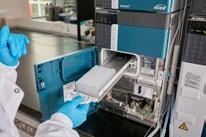
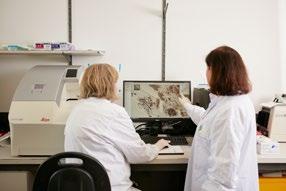
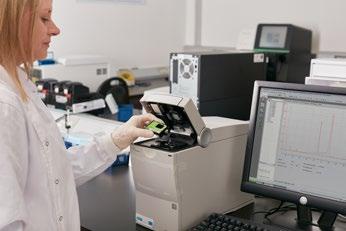
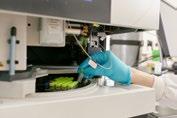
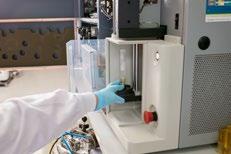
the scientific community; both academic and commercial. Recent equipment procurements funded through internal UCD and SFI infrastructure grants such as the National Preclinical Imaging Centre and the Comprehensive Molecular Analysis Platform will allow researchers to gather the requisite preliminary data to strengthen future grant funding proposals and undertake world-leading research. The core technology platforms are an area of exceptional strength and value-add to the scientific community that we intend to harness, bolster and promote.
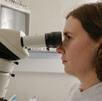
Research activities in UCD Conway Institute are aligned under three overarching umbrella themes that enables the delivery of strategic goals and objectives.
DURING 2022-2026, this umbrella construct will continue to harness the collaborative strengths of Institute researchers, provide the agility required to respond to opportunities that arise and build capacity to address the global societal imperative to build a healthier world. Bringing people together to develop themes at scale is enabling us to create critical mass and leadership. This is proving successful as evidenced by leadership in large international programmes such as the IMI SOPHIA and HIPOCRATES in obesity and psoriatic arthritis research, respectively.
In addition to facilitating team-based science, the Institute also needs to be a home for individually excellent scientists, particularly in respect of ‘blue skies’ research, and to welcome and foster interdisciplinarity.
Each thematic area is coordinated by 3 theme champions, at senior and Ad Astra/emerging investigator levels who are committed to providing the necessary leadership and collegiality to enable collaborative activity while being supportive of individual excellence. Theme champions volunteer for this role for periods of 2-3 years over the lifetime of this strategy.
Using information about a person’s genes, proteins or environment to develop more precise medical models to identify, prevent or treat disease.
The benefit of close collaborations between academic and clinical colleagues became evident and relied on during the pandemic. As an Institute, we demonstrated that it is possible to find creative ways to go beyond traditional academic-clinical boundaries to find new ways of working while demonstrating that excellence underpins every activity.
We now have the opportunity to further strengthen these collaborations under this theme and in conjunction with the affiliated teaching hospitals and existing links to the wider Ireland East Hospital Group through UCD Health Affairs.
Several large-scale Conway led programmes focus on precision medicine in cancer, obesity and diabetes, and arthritis. Expertise in areas of infectious disease and inflammation were vital to an effective response to the evolving health crisis during the pandemic. We now can further strengthen these collaborations under the Personalised & Translational Medicine theme.
Creating new knowledge by studying the fundamental processes in cells and living organisms to better understand health and disease.
The pandemic clearly demonstrated the absolute necessity of basic research to drive discoveries that will positively impact on the health and wellbeing of society. Funding agencies are now providing greater opportunities to support ‘blue skies’ research pursuits. As an Institute, this presents greater opportunity to enable researchers with Discovery Research programmes to excel as we continue to enshrine this concept within our research strategy.
Innovation in research is critical and the pandemic has shown us that this cannot be confined solely to achieving commercial success at the end of the discovery pipeline.
Enabling scientists to pursue blue-skies, hypothesis-based research that will ultimately drive discovery is crucial. To encourage researchers to pursue their own ideas driven solely by the criterion of excellence, we will encourage a culture that enables play as an integral part of the design thinking process. Play is a means by which we create and discover new things. Scientists should formulate and act on questions that they believe are important to their field (the ‘what if’ questions) and be enabled to ‘fail fast’ to succeed.
Exploring the complex interplay between the health of animals, humans and the environment to improve the condition of each.
From extreme weather events to the COVID-19 pandemic, the devastating impacts of imbalance in the complex interplay between animals, humans and the environment is evident. A just and sustainable future is possible by adapting a One Health approach that explores this interplay and creates new knowledge that will ultimately improve the health of each. UCD is the only university on the island of Ireland with Schools of Veterinary Medicine, Medicine and a diverse group of scientists in the Colleges of Science; and Health & Agricultural Science with expertise in One Health fields. Consequently, we are perfectly positioned to support the global One Health agenda.
At UCD Conway Institute, we will focus on the infection and inflammation aspects of One Health research, harnessing core expertise within the Institute. Building on the highly successful collaboration established to monitor COVID-19 in wastewater in Ireland, we will apply our expertise to environmental water analysis across the island. The growing concern of antimicrobial resistance will have a critical impact on global health so we will focus on the interplay between antimicrobial resistance and agricultural practices. Finally, we will enhance the existing expertise in comparative oncology and will incorporate and apply cancer genomics to the field of animal oncology.
Enable researchers to increase the quality & quantity of research and innovation outputs
Objective Drive excellent research by enabling researchers to pursue ambitious research programmes that consistently deliver high calibre outputs with lasting societal impact and celebrating their successes.
Actions
1 Consolidate expertise around technology and research focus areas and identify emerging areas through bottom-up approaches.
2 Share best practice between researchers in case study format.
3 Seed and support opportunities in defined thematic areas to create synergies, develop relationships, collaborations, innovate and and ‘fail fast’ to succeed.
4 Host showcase sessions and bespoke interactions with external parties to mediate long-term engagement.
5 Celebrate success with internal recognition and external dissemination.
Enable the attraction, retention and capacity building of excellent researchers
Objective
Build and strengthen a collaborative community that provides an invigorating, interdisciplinary environment for facilitating excellence in biomedical research.
Actions
1 Build closer engagement with cognate Colleges & Schools (e.g., new UCD Conway Stakeholder Forum; Director participates in relevant College RIIGs).
2 Strengthen engagement with research active clinicians and veterinarians.
3 Implement supports for Ad Astra and emerging investigators.
4 Train the next generation of postdoctoral and PhD researchers to exacting international standards while supporting their career development.
5 Cultivate an open, supportive and collegial environment reflecting the values of equality, diversity and inclusion.
Objective
Provide a dedicated infrastructure and ecosystem to enable excellence in research and innovation.
Actions
1 Ensure the integrity and functionality of infrastructural supports that enable researchers to conduct excellent research and innovation activities.
2 Promote a sustainability culture within the Institute with specific focus on developing sustainable practices in laboratory research to achieve ‘Green Lab’ certification.
3 Support the development and enhancement of the core technologies as sectoral leaders while enhancing their visibility within life sciences research.
4 Support access to core technology and transversal skill education and training modules for researchers.
5 Encourage and facilitate broader interactions across disciplines and between research institutes within UCD.
Enhance and communicate the relevance and impact of research
Objective
Communicate the expertise, ambition and achievement of researchers and highlight the societal impact of activities including a healthier population, innovations in diagnosis and treatment, education and training.
Actions
1 Build the reputation of Institute researchers nationally and internationally and highlight research outputs, outcomes and societal impact through a comprehensive communications strategy.
2 Empower researchers to engage in dialogue with stakeholders through training.
3 Act as a focal point for engaged research including public & patient involvement in health research.
4 Contribute to the growth of Ireland’s science capital and trust in science through initiatives that inspire and empower communities.
5 Foster emerging interests in STEM careers by pupils at secondary school level particularly among those at educational disadvantage due to social, economic or learning differences.

5% increase in research outputs year on year, with a focus on quality in line with discipline-specific definitions of excellence and impact.
40 events annually to showcase expertise and build collaborations with internal and external stakeholders (33% increase).
15 educational and training events focused on leading technology expertise and transversal research skills.
10% increase in earned media for example press mentions earned through media outreach, social media shares or organic search traffic.
We recognise the importance of being able to adapt the implementation of this strategy in response to evolving challenges and opportunities. The Director with Institute Theme Leads will define the priorities annually and, together with the directorate team, will devise an implementation plan to deliver these activities towards achieving stated goals and objectives.
Devise an implementation plan (2022-2026) for focused thematic and organisational actions to achieve strategic goals.
Identify three Ad Astra/emerging investigators to champion specific thematic areas alongside two senior colleagues in order to represent and respond to the needs of investigators at all career stages.
Calendar of meetings with Institute leadership and management team for implementation, monitoring and reporting.
Calendar of meetings with internal Institute community (e.g., townhalls, retreat) and UCD fora (College level and VPRII) for wider internal engagement.
Identify mechanisms to acquire and renew core technology equipment in the absence of a university-wide initiative such as UCD Equip.
It is very important that UCD Conway proactively pre-empts emerging research opportunities and, as such, key research themes and focus may need to change over time to address evolving developments. To this end, we will work with UCD Research to ensure that emerging research campaigns align with the memberships’ strengths and opportunities within current and future national and international research priorities environment.

